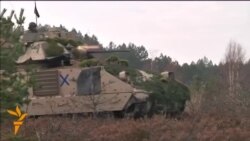Around 2,500 troops from nine countries are taking part in NATO exercises in Lithuania code named "Iron Sword." The two-week exercises were originally planned as a purely Lithuanian operation, but were expanded in response to Russia's actions in Ukraine. NATO says Russia supports separatists in eastern Ukraine with troops and equipment, which Russia denies. (Reuters)
EU foreign-policy chief says more sanctions on Russia possible, AP reports:
The European Union's new foreign policy chief condemned the recent rebel-held elections in eastern Ukraine as "illegal and illegitimate" and said that the bloc could pursue further sanctions against Russia as it seeks to preserve Ukraine's territorial sovereignty.
During her first trip abroad in her new role, Federica Mogherini said in Warsaw that "the issue of sanctions is always on the table." She stressed that any decisions would reflect the will of all 28 EU members.
She said the "so-called" elections in eastern Ukraine Sunday, which Moscow has praised, "were a very negative sign," and that "the situation on the ground is extremely negative, with people dying yesterday."
She said the EU's strategy toward Russia and Ukraine would be discussed Nov. 17 at a meeting of EU foreign ministers.
AFP is reporting that Ukraine takes another step toward a "frozen" conflict in the east:
Ukraine announced Thursday that anyone crossing in or out of areas controlled by pro-Russian separatists in the east of the country will have to show a passport.
The rule, announced by the border guards service, was aimed at sealing off the separatist region in what will de facto become an internal border in the seven-month conflict.
Ukrainian citizens will be allowed to travel in and out of the area "on condition of showing passports," the border guards service said in a statement.
Foreigners will "be sent to filtration points to determine the purpose of their visit" and will have "to show a passport or the required visa," the statement said.
Officials said the passport regime will apply to the area of what the government calls the "anti-terrorist operation," but did not specify the exact outlines of the area. The rule appeared to signal the creation of an increasingly formal border between the Russian-backed separatist zone and the rest of Ukraine.






